Atp synthase - Study guides, Class notes & Summaries
Looking for the best study guides, study notes and summaries about Atp synthase? On this page you'll find 1196 study documents about Atp synthase.
Page 4 out of 1.196 results
Sort by
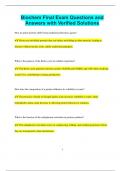
-
Biochem Final Exam Questions and Answers with Verified Solutions
- Exam (elaborations) • 22 pages • 2024
- Available in package deal
-
- $9.99
- + learn more
Biochem Final Exam Questions and Answers with Verified Solutions How do prion proteins differ from traditional infectious agents? Prions are misfolded proteins that can induce misfolding in other proteins, leading to diseases without nucleic acids, unlike traditional pathogens. What is the purpose of the Krebs cycle in cellular respiration? The Krebs cycle generates electron carriers (NADH and FADH2) and ATP while oxidizing acetyl-CoA, contributing to energy production. How does ...
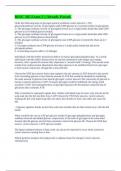
-
BIOC 385 Exam 2 || Already Passed.
- Exam (elaborations) • 9 pages • 2024
- Available in package deal
-
- $11.29
- + learn more
Order the following steps in glycogen particle synthesis correct answers 1- The glycosyltransferase activity of glycogenin adds UDP-glucose to a tyrosine residue in glycogenin. 2- The glycogen synthase activity of glycogenin forms an α-1,4 glycosidic bonds that adds UDP-glucose to an O-linked glucose residue. 3- The glycogen synthase activity of glycogenin forms an α-1,4 glycosidic bond that adds UDP-glucose to an O-linked glucose disaccharide. 4- The glycogen synthase activity of glycogeni...
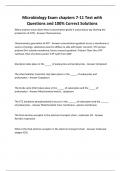
-
Microbiology Exam chapters 7-11 Test with Questions and 100% Correct Solutions
- Exam (elaborations) • 21 pages • 2024
- Available in package deal
-
- $12.99
- + learn more
When protons move down there concentration grade it and produce atp (fueling the production of ATP) - Answer Chemiosmosis Chemiosmotic generation of ATP - Answer concentration gradient across a membrane is source of energy. substances want to diffuse to side with lower concentr. ETC pumps protons (H+) outside membrane, forms concentr gradient. Protons 'flow' thru ATP synthase, flow of protons power ATP synth from ADP. Glycolysis takes place in the _____ of eukaryotes and prokaryotes - An...
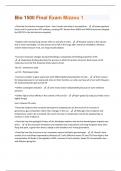
-
Bio 1500 Final Exam Mizzou 1 Questions With Answers Graded A+ Assured Success
- Exam (elaborations) • 20 pages • 2024
- Available in package deal
-
- $7.99
- + learn more
• Describe the electron transport chain - how it works and what it accomplishes - proton gradient forms and H+ pushes thru ATP synthase, creating ATP- formed from NADH and FADH2-electrons adopted by H20 (O2 is the last electron acceptor) • Explain what residual lung volume refers to and why it exists - Residual volume is the volume that is never exchanged. It is the amount of air left in the lungs after maximum exhalation. Residual volume exists because if not, our lungs would collapse....
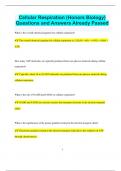
-
Cellular Respiration (Honors Biology) Questions and Answers Already Passed
- Exam (elaborations) • 11 pages • 2024
- Available in package deal
-
- $9.99
- + learn more
Cellular Respiration (Honors Biology) Questions and Answers Already Passed What is the overall chemical equation for cellular respiration? The overall chemical equation for cellular respiration is: C6H12O6 + 6O2 → 6CO2 + 6H2O + ATP. How many ATP molecules are typically produced from one glucose molecule during cellular respiration? Typically, about 36 to 38 ATP molecules are produced from one glucose molecule during cellular respiration. What is the role of NADH and FADH2 in c...
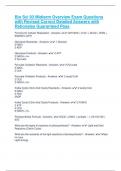
-
Bio Sci 93 Midterm Overview Exam Questions with Revised Correct Detailed Answers with Rationales Guaranteed Pass
- Exam (elaborations) • 13 pages • 2024
- Available in package deal
-
- $16.99
- + learn more
Bio Sci 93 Midterm Overview Exam Questions with Revised Correct Detailed Answers with Rationales Guaranteed Pass Formula for Cellular Respiration - Answers - C6H12O6 + 6 O2 -> 6CO2 + 6H20 + ENERGY (ATP) Glycolysis Reactants - Answers - 1 Glucose 2 NAD+ 2 ADP Glycolysis Products - Answers - 2 ATP 2 NADH + H+ 2 Pyruvate Pyruvate Oxidation Reactants - Answers - 2 Pyruvate 2 NAD+ 2 CoA Pyruvate Oxidation Products - Answers - 2 acetyl CoA 2 CO2 2 NADH + H+ Krebs Cycle (Ci...
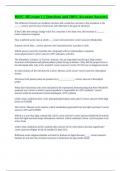
-
BIOC 385 exam 1 || Questions and 100% Accurate Answers.
- Exam (elaborations) • 20 pages • 2024
- Available in package deal
-
- $12.99
- + learn more
The difference between an oxidation reaction and a reduction reaction is that oxidation is the _____ correct answers loss of electrons and reduction is the gain of electrons. If the Gibbs free energy change value for a reaction is less than zero, this reaction is ______ correct answers exergonic Flux is defined as the rate at which ___ is/are interconverted. correct answers Metabolites Enzyme active sites... correct answers Are characterized as a pocket or cleft Which answer correctl...
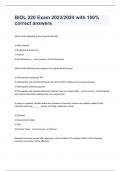
-
BIOL 220 Exam 2023/2024 with 100% correct answers
- Exam (elaborations) • 32 pages • 2023
-
- $15.49
- + learn more
Which of the following is/are shared by all cells? a) Mitochondria b) Endoplasmic Reticulum c) Nucleus d) Cell Membrane - correct answer d) Cell Membrane Which of the following best supports the endosymbiotic theory? a) Mitochondria synthesize ATP b) Chloroplasts and mitochondria both use host cell ATP synthases for energy generation c) Chloroplasts synthesize glucose d) Chloroplasts and mitochondria both maintain their own unique DNA - correct answer d) Chloroplasts and mitoc...
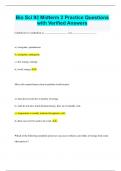
-
Bio Sci 93 Midterm 2 Practice Questions with Verified Answers
- Exam (elaborations) • 14 pages • 2024
- Available in package deal
-
- $9.99
- + learn more
Bio Sci 93 Midterm 2 Practice Questions with Verified Answers Catabolism is to anabolism as ___________________ is to ___________________. a.) exergonic; spontaneous b.) exergonic; endergonic c.) free energy; entropy d.) work; energy b Most cells cannot harness heat to perform work because a.) heat does not involve a transfer of energy. b.) cells do not have much thermal energy; they are eventually cool. c.) temperature is usually uniform throughout a cell. d.) heat can neve...
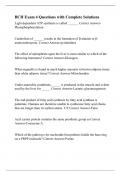
-
BCH Exam 4 Questions with Complete Solutions
- Exam (elaborations) • 15 pages • 2024
-
- $13.99
- + learn more
Light dependent ATP synthesis is called ______. Correct Answer-Photophosphorylation Catabolism of ______ results in the formation of β-alanine or β-aminoisobutyrate. Correct Answer-pyrimidines The effect of epinephrine upon the liver is most similar to which of the following hormones? Correct Answer-Glucagon What organelle is found in much higher amounts in brown adipose tissue than white adipose tissue? Correct Answer-Mitochondria Under anaerobic conditions, _____ is produced in t...

Study stress? For sellers on Stuvia, these are actually golden times. KA-CHING! Earn from your study resources too and start uploading now. Discover all about earning on Stuvia


